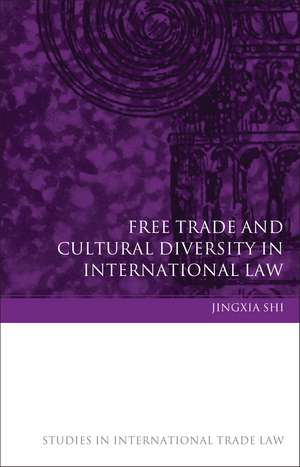Free Trade and Cultural Diversity in International Law: Studies in International Trade and Investment Law
Autor Jingxia Shien Limba Engleză Hardback – 29 apr 2013
Din seria Studies in International Trade and Investment Law
- 13%
 Preț: 195.38 lei
Preț: 195.38 lei - 30%
 Preț: 901.55 lei
Preț: 901.55 lei - 27%
 Preț: 444.01 lei
Preț: 444.01 lei - 37%
 Preț: 510.83 lei
Preț: 510.83 lei - 30%
 Preț: 512.69 lei
Preț: 512.69 lei - 19%
 Preț: 303.80 lei
Preț: 303.80 lei - 22%
 Preț: 231.24 lei
Preț: 231.24 lei - 30%
 Preț: 601.63 lei
Preț: 601.63 lei - 30%
 Preț: 781.55 lei
Preț: 781.55 lei - 13%
 Preț: 238.76 lei
Preț: 238.76 lei - 30%
 Preț: 570.11 lei
Preț: 570.11 lei - 30%
 Preț: 1016.59 lei
Preț: 1016.59 lei - 30%
 Preț: 600.15 lei
Preț: 600.15 lei - 30%
 Preț: 778.68 lei
Preț: 778.68 lei - 30%
 Preț: 955.20 lei
Preț: 955.20 lei - 30%
 Preț: 540.80 lei
Preț: 540.80 lei - 30%
 Preț: 956.09 lei
Preț: 956.09 lei - 30%
 Preț: 599.66 lei
Preț: 599.66 lei - 26%
 Preț: 777.71 lei
Preț: 777.71 lei - 22%
 Preț: 269.66 lei
Preț: 269.66 lei - 22%
 Preț: 266.30 lei
Preț: 266.30 lei - 18%
 Preț: 299.86 lei
Preț: 299.86 lei - 18%
 Preț: 307.97 lei
Preț: 307.97 lei - 18%
 Preț: 306.26 lei
Preț: 306.26 lei - 18%
 Preț: 305.53 lei
Preț: 305.53 lei - 27%
 Preț: 447.39 lei
Preț: 447.39 lei - 18%
 Preț: 321.48 lei
Preț: 321.48 lei - 30%
 Preț: 512.54 lei
Preț: 512.54 lei - 30%
 Preț: 573.70 lei
Preț: 573.70 lei - 30%
 Preț: 511.40 lei
Preț: 511.40 lei -
 Preț: 374.55 lei
Preț: 374.55 lei
Preț: 543.08 lei
Preț vechi: 775.59 lei
-30% Nou
Puncte Express: 815
Preț estimativ în valută:
103.92€ • 108.79$ • 85.99£
103.92€ • 108.79$ • 85.99£
Carte tipărită la comandă
Livrare economică 05-19 aprilie
Preluare comenzi: 021 569.72.76
Specificații
ISBN-13: 9781849464253
ISBN-10: 1849464251
Pagini: 360
Dimensiuni: 156 x 234 x 15 mm
Greutate: 0.69 kg
Ediția:New.
Editura: Bloomsbury Publishing
Colecția Hart Publishing
Seria Studies in International Trade and Investment Law
Locul publicării:London, United Kingdom
ISBN-10: 1849464251
Pagini: 360
Dimensiuni: 156 x 234 x 15 mm
Greutate: 0.69 kg
Ediția:New.
Editura: Bloomsbury Publishing
Colecția Hart Publishing
Seria Studies in International Trade and Investment Law
Locul publicării:London, United Kingdom
Caracteristici
This book attempts to reconcile the concept of free trade with a key non-trade social value - cultural diversity - in an era of economic globalization.The author seeks to formulate a balanced view of the challenge of protecting and promoting cultural diversity while also recognizing the important goal of trade liberalization.An interesting study for all those working in the field of trade law.
Notă biografică
Jingxia Shi is a Professor of Law and Deputy Dean at the Law School, China University of International Business & Economics (UIBE). She also serves as the director of UIBE International Law Institute.
Cuprins
1 Introduction: Globalisation as the Context 1.1 Globalisation and Culture 1.2 Globalisation and Trade 1.3 Raising the Issue: Globalisation, Culture and Trade 1.4 The Structure of the Book 2 Culture and Cultures in Comparative Perspectives: Towards a Synthesis 2.1 Introduction 2.2 Humanist: Culture as 'The Best of Everything' 2.3 An Anthropological View: We Are Our Culture 2.4 Culture as Identity: Centering on Identity Crisis 2.5 Culture as Commerce: The Perspective of Cultural Economic Interests 2.6 Culture as Human Rights: Revisiting Cultural Rights 2.7 Culture as Resource: A Sustainability Perspective 2.8 Chapter Recap and Further Reflections 3 Domestic Cultural Policy and Measures: The Case of the Audiovisual Sector 3.1 Introduction 3.2 An Overview of Cultural Policies and Measures 3.3 Foreign Ownership Restriction 3.4. Local Content Regulations 3.5 Subsidies and Tax Concessions 3.6 Other Cultural Policies and Measures 3.7 Protective Policies versus Effi cient Regulation? 3.8 Conclusion 4 UNESCO and Cultural Diversity: Theories and Approaches 4.1 Introduction 4.2 Historicism, Anthropology and UNESCO'S Conception of Culture 4.4 UNESCO'S Undertakings on Culture and Cultural Diversity: An Overview 4.5 Culture and Development 4.6 Culture and Globalisation 4.7 The UNESCO Convention Cultural Diversity 4.8 Conclusion 5 The Treatment of Culture in the GATT/WTO (I): Theoretical and Legislative Framework 5.1 Introduction 5.2 Comparative Advantage Theory and its Application to Cultural Products 5.3 An Institutional Evolution and a Shift in Telos 5.4 Trade in Cultural Goods: GATT Article IV and its Legacy 5.5 Trade in Cultural Services: An Observation on the Audiovisual Sector 5.6 General Exception Clauses 5.7 Trade Remedy Measures Which May Involve Cultural Products 5.8 The Treatment of Culture in Emerging Areas 5.9 Concluding Remarks 6 The Treatment of Culture under the GATT/WTO (II): Case Study and Identifi cation of Problems 6.1 Introduction 6.2 A Brief Account of GATT/WTO Dispute Settlement 6.3 Canada-Periodicals 6.4 China-Publications and Audiovisual Products 6.5 How Likely is a Party to Invoke UNESCO Instruments as a General Cultural Defence? 6.6 Applying the 'Public Morals' Exception to Cultural Products 6.7 Distinguishing Cultural Goods from Cultural Services 6.8 Factoring Cultural Elements into Deciding the 'Likeness' of Cultural Products 6.9 Concluding Remarks 7 Culture under Regional Agreements: The Perspectives from the EC/EU and NAFTA 7.1 Introduction 7.2 The European Community/European Union 7.3 NAFTA 7.4 The Interface between Regional and Global Trade Agreements: The Issue of Forum Shopping, Among Others 7.5 Further Observations 8 Reform Proposals for the Culture and Trade Quandary 8.1 Introduction 8.2 A Recap of the Interaction between Trade and Culture 8.3 Designing WTO-Compatible Domestic Policy Measures 8.4 Searching for Solutions within the Trade System 8.5 The Relationship between the UNESCO Convention and WTO Agreements 8.6 Connecting WTO Rules with the UNESCO Convention: The Perspective of Dispute Settlement 8.7 The Margin of Appreciation Doctrine: Ripe for Extrapolation? 8.8 Conclusion 9 Concluding Remarks
Descriere
This book attempts to reconcile the concept of free trade with a key non-trade social value - cultural diversity - in an era of economic globalization.
